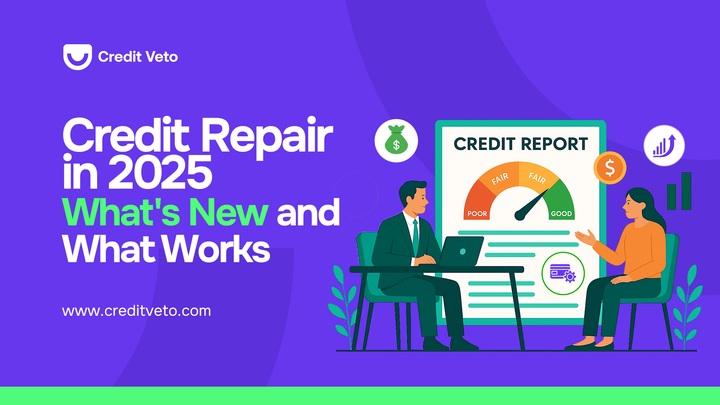Do Secured Cards Still Work for Credit Building in 2025?
Wondering if secured cards for credit building are still effective in 2025? Yes, they are, but you must learn how secured cards work, their benefits, and the difference between secured and unsecured cards.

If you're struggling to get approved for a credit card—or if you’re trying to bounce back from a bad credit score —you’ve probably heard about secured credit cards. But with all the fintech options out there in 2025, you might be wondering: are secured cards for credit building still effective? And more importantly, are they still worth your time and money?
The answer is a big YES! According to a 2024 report by Experian, over 38% of Americans with credit scores below 600 were able to increase their scores by 50+ points within 6 months of responsibly using a secured credit card.
Let’s break it all down in plain English. We’ll cover how secured cards work, why they’re still a powerful tool for building credit, and how they compare to unsecured cards. We’ll also show you how to use secured cards the right way to improve your credit score faster.
What Are Secured Cards for Credit Building??
A secured credit card is a type of credit card that requires a cash security deposit as collateral. The credit limit on the card is usually equal to the deposit. For example, if you deposit $500, your credit limit will likely be $500.
This deposit serves as a form of security for the lender in case you default on the card, but if you make your payments on time, your deposit will be refunded at the end of the card’s life.
The point of a secured card isn’t the spending power—it’s the credit-building potential. When you use it wisely, the card issuer reports your payment activity to the three major credit bureaus (Equifax, Experian, and TransUnion), which helps build or rebuild your credit profile.
How Does It Help Build Credit?
Secured cards build credit by reporting your activity to the three major credit bureaus: Equifax, TransUnion, and Experian. When you use the card and make timely payments, the card issuer reports the payment history to the credit bureaus, which can help boost your credit score. Over time, responsible use of a secured credit card can lead to improved credit.
Key Benefits of Secured Cards for Credit Building in 2025:
- Establish or Rebuild Credit: If you have no credit history or bad credit, a secured credit card is a great way to start.
- Low Approval Barriers: Secured cards are generally easier to qualify for, making them ideal for individuals with low or no credit.
- Reports to All Major Credit Bureaus: Timely payments help to improve your credit score and establish a positive credit history.
- Easy Path to Unsecured Cards: After several months of responsible usage, many credit card issuers may offer you an unsecured card.
Why Secured Cards Still Work in 2025
Even with modern apps and AI-driven credit tools, secured cards are still one of the most effective and accessible ways to build credit in 2025. Here's why:
- Low barrier to entry: Even if you have a low score or no credit history at all, you can usually get approved for a secured card.
- Full bureau reporting: Most secured cards report your usage and payment behavior to all three major credit bureaus, just like unsecured cards.
- Controlled spending: Since your credit limit is based on your deposit, it's easier to avoid overspending.
- Credit education: Many secured cards now come with credit monitoring and tools to track your progress.
Secured vs. Unsecured Cards: What’s the Difference?
While secured cards are a great option for building credit, it’s important to understand how they differ from unsecured credit cards. Here's a side-by-side comparison:
1. Credit Limit
- Secured Cards: Your credit limit is determined by the deposit you make. For example, a $500 deposit equals a $500 limit.
- Unsecured Cards: Your credit limit is based on your creditworthiness and income, with no upfront deposit required.
2. Deposit Requirement
- Secured Cards: Require a deposit, which acts as collateral in case you miss payments.
- Unsecured Cards: These do not require any deposit, but the issuer assesses your creditworthiness based on your credit score, income, and financial history.
3. Approval Process
- Secured Cards: Easier to qualify for, as the deposit mitigates the lender’s risk.
- Unsecured Cards: Requires a good credit score to qualify. For those with poor or no credit, approval may be difficult.
4. Interest Rates & Fees
- Secured Cards: Typically have higher interest rates and fees, especially if your credit is poor.
- Unsecured Cards: Usually have more competitive interest rates for those with good credit. However, they may charge higher fees for those with fair or poor credit.
5. Credit Building
- Secured Cards are ideal for building or rebuilding credit, as they report to all major credit bureaus.
- Unsecured Cards: Also help build credit but typically require a better credit score for approval. They offer higher credit limits and don’t require an initial deposit.
Which One Is Right for You?
- If you’re starting from scratch or recovering from bad credit, a secured card may be your best option.
- If you have a solid credit history and can qualify for an unsecured card, then an unsecured card is often better in the long run, as it offers greater flexibility and benefits without needing a deposit.
How to Use Secured Cards for Maximum Credit Building in 2025
If you’re serious about improving your credit score, here are some tips for using secured cards effectively:
1. Make Timely Payments
Always pay your bills on time. Late payments can negatively impact your credit and will be reported to the credit bureaus.
2. Keep Your Credit Utilization Low
Try to keep your credit utilization ratio under 30%. For example, if your credit limit is $500, try not to use more than $150.
3. Avoid Opening Multiple Accounts
Opening too many accounts in a short period can hurt your credit score. Stick to one secured card and use it responsibly.
4. Monitor Your Credit
Regularly check your credit report for errors and report any discrepancies promptly. Credit monitoring services like that of Credit Veto can help you dispute errors efficiently.
5. Upgrade to an Unsecured Card
Once your credit improves, many card issuers will allow you to upgrade to an unsecured card. By then, you’ll have better credit and a higher limit.
Remember, your credit score is made up of five main factors:
- Payment history (35%) – Paying your secured card on time helps establish a strong payment track record.
- Credit utilization (30%) – Keeping your balance low compared to your credit limit improves your utilization ratio.
- Credit age (15%) – The longer you have the card open, the more it helps your average account age.
- Credit mix (10%) – Having a credit card (even a secured one) helps diversify your credit types.
- New credit inquiries (10%) – Opening a secured card causes a small, temporary dip, but the long-term gains far outweigh this.
So yes, secured cards for credit building still work. They touch nearly every part of the credit scoring model
Real Talk: When Secured Cards Don’t Work
Secured cards aren't a miracle fix. They can hurt your credit if:
- You miss payments (which will be reported to credit bureaus)
- You max out the card regularly
- You open one but never use it (no activity = no credit-building benefit)
The key is to use it monthly, pay it off in full, and keep your balance under 30% of your limit.
Can You Graduate to an Unsecured Card?
Yes. Many secured card issuers (like Capital One or Discover) offer graduation options after 6–12 months of on-time payments. You’ll get your deposit refunded, and you’ll be upgraded to an unsecured card.
If your card doesn’t offer this, you can still use your improved score to apply for an unsecured card elsewhere.
How Credit Veto Supports You on Your Credit-Building Journey
At Credit Veto, we don’t just help you dispute errors—we guide you through the entire credit rebuilding process. That includes:
- Helping you pick the right secured card based on your goals
- Monitoring your credit as you build it
- Disputing any inaccuracies that show up
- We offer flat-rate, affordable services with no hidden fees
Our goal? To empower you to take control of your credit with confidence. Don’t build credit alone. Join thousands of people using Credit Veto to fix errors, track their credit, and unlock a better financial future.
FAQs
Q1: Does a secured credit card help build credit?
Yes! Secured credit cards help build credit by reporting your payment history to the credit bureaus. Responsible use, like making timely payments and keeping credit utilization low, can improve your credit score over time.
Q2: How long does it take to build credit with a secured card?
Typically, it takes around 3-6 months of timely payments and responsible use to see significant improvements in your credit score.
Q3: Can I get an unsecured credit card after using a secured card?
Yes! If you've used your secured card responsibly and improved your credit score, many issuers will offer you an unsecured credit card with better terms.
Q4: Can secured cards help with bad credit in 2025?
Absolutely! Secured credit cards are one of the most effective tools for rebuilding bad credit in 2025.
Q5: Is a secured card better than a credit builder loan?
For most people, yes. A secured card is more flexible and reports monthly usage, which has a stronger credit-building effect.
Q6: Can I use a secured card if I have collections or bankruptcy?
Yes. Many secured cards are designed for people with damaged credit or a history of bankruptcy.
Q7: What happens if I stop using my secured card?
If it remains inactive, the issuer may close it, which can affect your credit utilization and credit age—two major credit score factors.
Q8: How do I dispute errors on my secured card’s credit report?
If you spot an error on your credit report, you can dispute it with the credit bureaus. Credit Veto can assist you with disputing inaccuracies and getting negative items removed from your report.
Conclusion: Secured Cards are Still Worth It in 2025
In 2025, secured cards continue to be a highly effective and accessible option for people looking to build or rebuild their credit. With low credit requirements and a proven track record, secured cards remain one of the best ways to establish a positive credit history.
If you’re ready to start building your credit, Credit Veto can guide you through disputing inaccuracies, tracking your progress, and choosing the best credit-building options
Now is the best time to start building your credit! Sign up for Credit Veto and get the credit-building tools and services you need to improve your credit score. Let’s make 2025 the year you take control of your financial future.




Comments ()